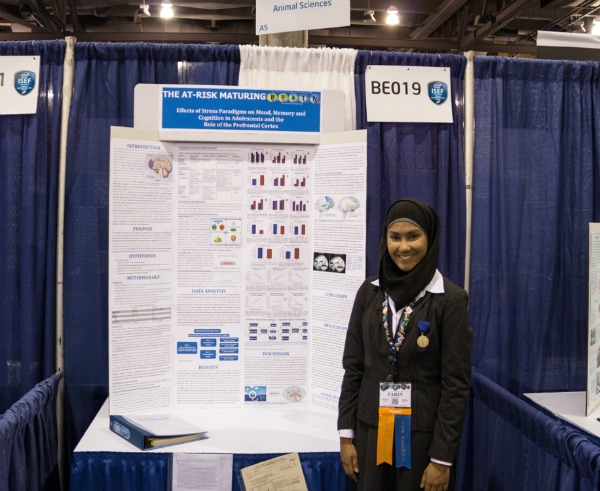
Seventeen-year old Zarin Rahman (pictured) noticed that the time she spent staring at screens started affecting her mood and school work. Rather than lock away her iPhone and laptop — an act most teens would find as loathsome as sharing their Facebook page with their parents—she decided to conduct her own study.
“I did this based on personal experience of screen time and academic performance and how I felt after long term screen time,” says Rahman, a 12th grader at Brookings (SD) High School. “So I wanted to experiment with effective screen depravation with adolescents in my age group.”
Rahman launched a scientific research project, testing a random group 67 of students between the ages of 13 to 18, comparing their screen time use against sleep depravation and stress. She read through literature published on the topics and chose survey subjects who were Internet users, not on medication and with no history of mental disabilities or disorders, she says. Students in the study self reported their sleep time. The findings rang true to what she suspected — that increased recreational screen time had a correlating affect with lack of sleep and stress. Rahman then used the results to alter her own behavior.
“I now limit my own recreational screen time because I know it has a subsequent affect,” she says. “Where I maybe spent five to five and a half per day, is now dramatically down to two hours at most.”
Rahman presented her paper, “The At-Risk Maturing Brain: Effects of Stress Paradigms on Mood, Memory and Cognition in Adolescents and the Role of the Prefrontal Cortex,” at the Intel International Science and Engineering Fair in May 2013, netting first place and a $5,000 scholarship in her category, as well as the top spot in the National Institutes of Health (NIH) Addiction Science Award, with an additional $2,500 scholarship and trip to Washington, DC. But the highlight of the experience for Rahman? Meeting the expert judges.
“Just talking with them and having someone who understood my passion and where I was coming from and my research, that was just a great experience,” she says.
Rahman’s deep love for science launched in elementary school, growing from a fascination in biology to an interest in behavioral science and the adolescent brain. She hopes to continue to work in the field in college, and has already had several offer her scholarships including Arizona State University, she says.
Before that, however, Rahman is already at work on her next behavioral science project for this year’s round of science fairs. Working alone, Rahman is nevertheless confident in her ability to complete her work — and believes other high school students should feel as similarly empowered, never believing they’re inferior to so-called professionals.
“I believe if you have the passion to find an answer to a question you want to answer you can do it,” she says. “You have to do research and never give up. You have to believe that perhaps you’re not as experienced but you’re just as intelligent. If you do the research you have the potential to complete this kind of science research at this caliber.”



I know too much screen time affects me in a negative way. I think all screens, including TV, should be off for a few hours before bed. I even gave up my beloved Kindle habit at night and went back to print books. (And I only hope she was researching about sleep deprivation, and not depravation!)
Though some people may be depraved from spending too much time looking at a screen, I think you really mean to be talking about screen and sleep deprivation not depravation!